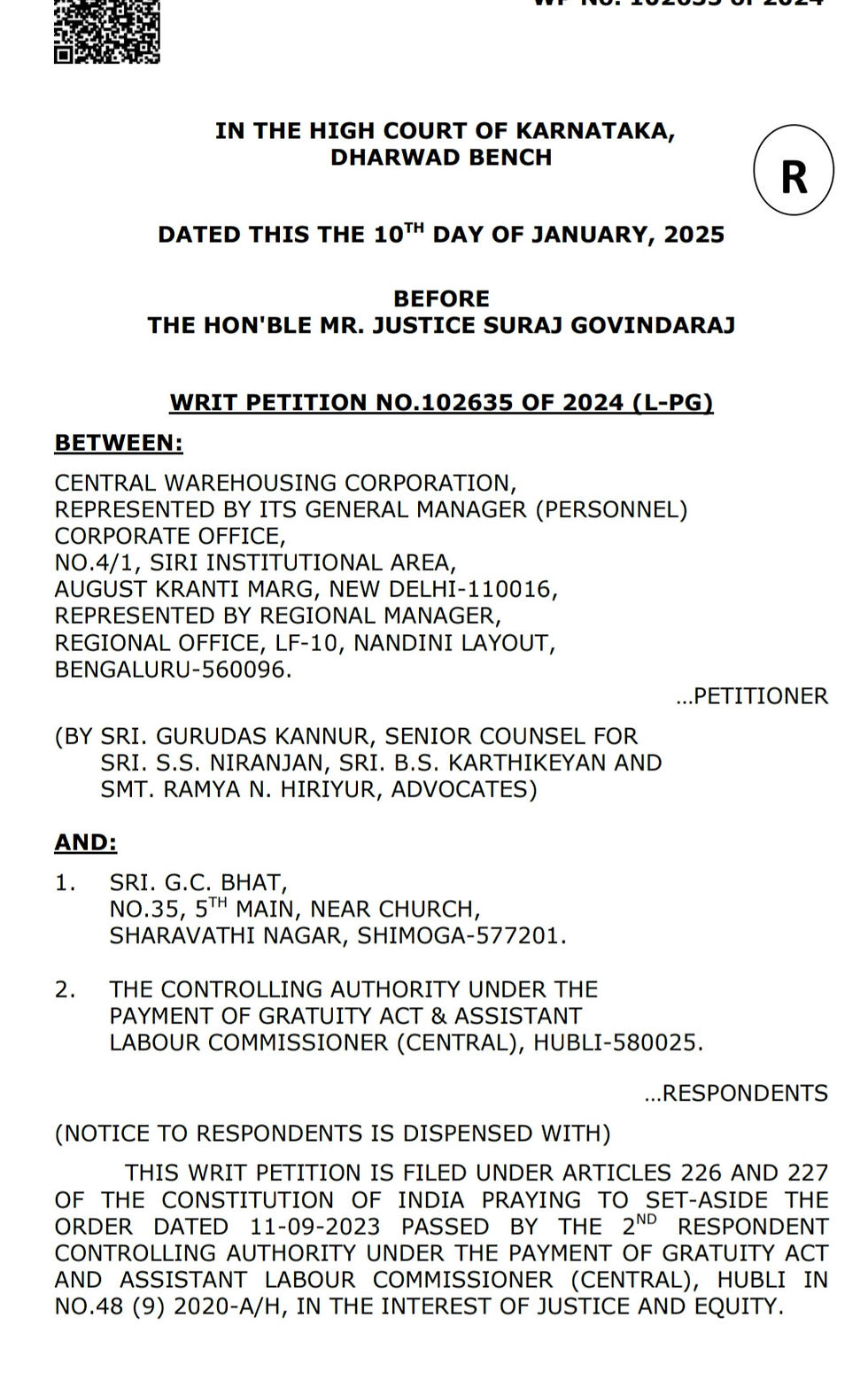Understanding Gratuity Forfeiture: Lessons from Central Warehousing Corporation v. G.C. Bhat
- M.R Mishra

- Jan 26, 2025
- 3 min read
Gratuity, a fundamental right under Indian labor laws, is often misunderstood, especially in cases involving employee misconduct. The Karnataka High Court’s recent judgment in Central Warehousing Corporation v. G.C. Bhat & Anr. sets an important precedent, clarifying that gratuity cannot be forfeited without due legal recovery proceedings. This article delves into the facts of the case, legal interpretations, and implications of this judgment.

Respondent No.1 after a long gap of 7 years from the date of dismissal filed proceeding before respondent No.2 in proceeding No.48(9) 2020-A/H claiming gratuity amount of Rs.14,03,860/- with interest alleging that he has earned the gratuity amount due to his service
The respondent, G.C. Bhat, was dismissed from Central Warehousing Corporation for allegedly issuing fictitious warehouse receipts, causing a financial loss of ₹1.71 crore. Despite the dismissal, the employee filed a claim for gratuity after a delay of seven years, citing health issues.
The petitioner, Central Warehousing Corporation (CWC), sought to challenge an order passed by the Controlling Authority under the Payment of Gratuity Act, directing the corporation to pay gratuity of ₹7,88,165 with 10% interest from December 12, 2013, to the date of payment to the respondent, G.C. Bhat. The respondent, a Junior Superintendent at CWC, was dismissed on December 6, 2013, due to serious charges of misconduct and misappropriation of funds. Allegedly, the respondent issued 93 negotiable warehouse receipts in fictitious names, causing losses amounting to ₹1.71 crore to the employer.
In the present case, there is a further delinquency of the other officers in not seeking for recovery of the aforesaid losses, which have occurred to the employer, the Central Warehousing Corporation being a public institution, dealing with public monies, which has been lost and I am of the considered opinion that the concerned officers, who were duty bound to initiate proceedings against respondent No.1 for the losses caused to the petitioner have failed in their duty, abdicated their responsibilities giving raise to a cause, for action to be taken against them, for their delinquency in not initiating proceedings against the dismissed employee, who had caused losses to the employer.
The Corporation could not without initiating proceedings for recovery, retain the gratuity amount, without such proceedings being initiated, the contention of the employer that losses have been caused will only remain a contention and is not one which has been adjudicated upon and orders passed
Thus, I am of the considered opinion that no proceedings having been initiated against respondent No.1 for recovery of the alleged losses. The question of the employer retaining the gratuity amount and forfeiting the same, would not arise. The management of the petitioner would be well advised to look into these aspects and initiate action for recovery of losses and or misappropriated amounts at least in future against the employee, who has been dismissed on those charges
The Controlling Authority under the Payment of Gratuity Act ordered the corporation to pay the gratuity with interest. The petitioner challenged this decision in the High Court, arguing that the gratuity should be forfeited due to the respondent's misconduct.
Key Legal Principles:
Payment of Gratuity Act, 1972:
Gratuity is a statutory right and can only be forfeited in cases of willful misconduct leading to financial losses, provided there is legal adjudication.
Mere dismissal for misconduct does not justify forfeiture.
Employer’s Responsibility:
Public institutions are duty-bound to initiate recovery proceedings for financial losses and cannot retain employee dues arbitrarily.

The Karnataka High Court’s decision is a landmark in labor law, reinforcing the sanctity of gratuity rights. It sends a clear message: employee dues cannot be withheld without due legal process, ensuring justice and accountability in employer-employee relationships.







Comments